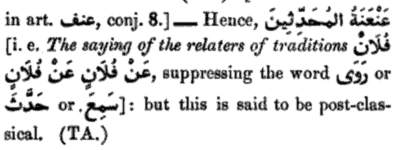an'ana / анъана / ئەنئەنە, the word for 'tradition' in modern Uzbek, Tajik, and Uyghur, has an interesting etymology connecting it to very early Islamic history.
This word initially puzzled me because it is not a word used in modern Iranian Persian, for instance, which made me suppose that perhaps it was adopted into Tajik from Central Asian Turkic.
However, when you see the word in pre-reform writing (i.e. in Arabic script), it is written with an ayn (عنعنه, or عنعنوی for 'traditional'), suggesting Arabic origin. Yet عنعنة is not active in modern standard Arabic, nor does it appear in Hans Wehr.
Scholars of early Islam can probably already see where this is going: the Hadith and other early Islamic sources record chains of transmission, or "isnads": "so and so reported *from* so and so..."; عن simply means 'from' in Arabic.
So, per Lane (where this term does appear), عنعنة means something like 'the sayings of the relaters of traditions' (who are passing those traditions on *from* one another).
This meaning can also be found in Persian dictionaries: کلمۀ «عنفلان» را در روایت تکرار کردن؛ نقل حدیث یا روایت از قول چند تن به ترتیب، چنانکه گویند روایت کرد فلان از فلان https://www.vajehyab.com/amid/%D8%B9%D9%86%D8%B9%D9%86%D9%87
(The Tajik Wikipedia article also makes note of this etymology: https://tg.wikipedia.org/wiki/%D0%90%D0%BD%D1%8A%D0%B0%D0%BD%D0%B0)
(Though the first definition for عنعنة given in both dictionaries relates to the phenomenon in certain Arab tribes of pronouncing hamzas ء as ayn ع; certainly not the origin of the term's journey into modern Central Asian languages.)
The interesting thing is that "citing one's sources" using isnads was a feature of early Islamic histories in Arabic; it was not an active feature of contemporary history writing in early modern Central Asia...
... which means the generic term for 'tradition' in modern Central Asian languages originated as a term alluding to Hadith science specifically (i.e. Tradition with a capital T).
I can't say I recall seeing this word all that often in pre-colonial sources; so why and how this term came to designate the generic idea of 'tradition' remains mysterious (to me, at least).
Anyway, I'd be curious to know how often this term pops up in other times and places, and with what connotations.

 Read on Twitter
Read on Twitter


